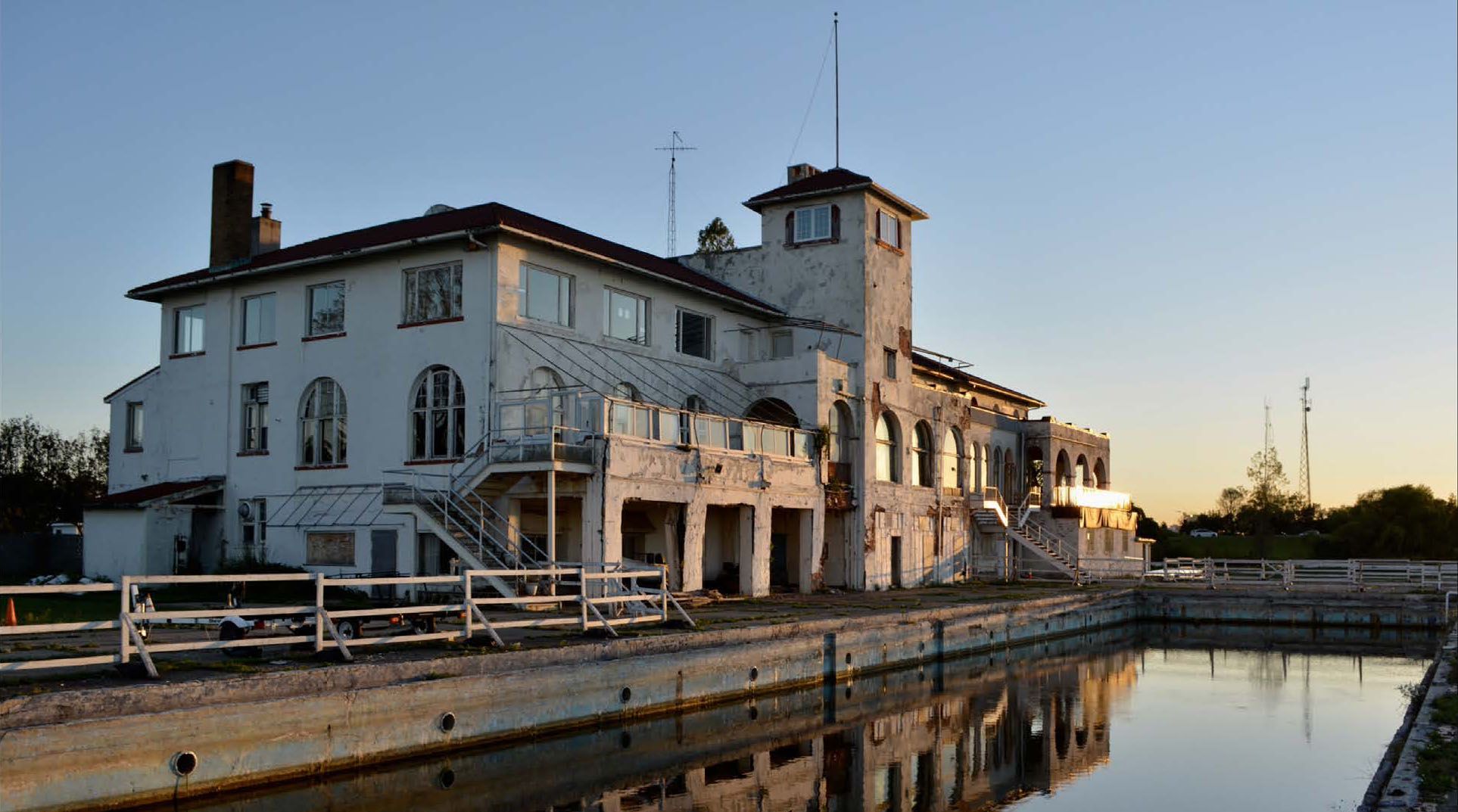
A new development proposal for the Belle Isle Boathouse would create a new welcome center for the Detroit River island, opening it to the public with a new marina and boating options, restaurants, restored event space and expanded areas for nonprofit rowing and sailing programs.
“After more than 100 years as a ‘private’ club, the boathouse will be a stopping point for all visitors to the island,” the plan’s developer says in the plan, dubbed the Belle Isle Gateway at the Detroit Boathouse.
The Michigan Department of Natural Resources, which operates Belle Isle under a contract with the city of Detroit, said at a recent Belle Isle Park Advisory Committee meeting that it had chosen a proposal to move forward with the restoration of the historic boathouse. It plans to release details at a public hearing Nov. 7 at Belle Isle’s Flynn Pavilion.
Crain’s obtained the plan through a Freedom of Information Act request.
Stuart Pitman Inc., a Detroit-based firm led by David Carleton, a vocal supporter of saving the boathouse, would be the lead developer of the $30 million-$35 million public-private project that would restore the facility.
Carleton was the developer of the historic Grand Army of the Republic building on Grand River Ave., which was formerly home to Parks & Rec Diner and Republic Tavern restaurants. Carleton said he intends to bring the same operating model to the boathouse plan.
The boathouse proposal was developed in just eight weeks given a tight turnaround deadline, and it is still a working document, he said. But if all goes according to plan, with financing secured and needed leases in place between the city, DNR and others, renovations would begin in June and the boathouse would reopen in summer 2027.
The Detroit Boat Club, a private club with facilities on Belle Isle starting in 1891, built the current boathouse in 1902. It is one of the oldest concrete structures in the country, according to the DNR, and the building became susceptible to water damage due to lack of maintenance over the past several decades. The city purchased the facility in 1996 when the Detroit Boat Club organization moved out of Detroit, according to the Detroit Historical Society.

“Initially, the preservation of the building itself was important to me. But as I got into it, I learned more about the sailing and rowing programs and really the importance of that accessibility on the island to the local community,” Carleton said. “It kind of increased my drive and love for the project.”
The DNR shuttered the condemned boathouse in summer 2022, leaving Friends of Detroit Rowing without a home and canceling events after a 15-foot section of a deteriorating porch slab and a ceiling collapse that expedited conversations about the future of the historic building.
Earlier estimates pegged the cost of restoration at $43 million, but the plan on the table estimates costs will be lower.
“There are a number of ways to skin a cat. With previous experience I’ve had in restoration projects, I think we can bring that number down,” Carleton said.
Per the proposal, a new company called Belle Isle Boathouse Holding LLC would serve as the development entity, supervising renovations and serving as the lessee of the 40,000-square-foot building with the city of Detroit and DNR. It would also enter subleases with Friends of Detroit Rowing and a hospitality management company, per the proposal submitted by Stuart Pitman. RCI Group would serve as the marina developer and Madison, Wis.-based InSite Consulting Architects would design the project.
Renovations would first focus on fortifying the building. “The heavy lift for the building will be the exterior. We want to make sure that doesn’t go through another winter and degradate any further,” Carleton said.
“The original boathouse construction period spanned just 8 months from the first piling being driven into the river to the ceremonial ribbon cutting. In hindsight, this expeditious building approach is in many ways the cause of the exterior’s current poor condition,” he said in the proposal.
The plan would remove all of the existing inappropriate material covering the building and repair the brick substructure. A variety of restored and new offerings would follow, including:
The restaurants and event space would produce revenue to support the operation and maintenance of the site, Stuart Pitman said in the proposal, noting it is in talks with “a successful local restaurant group” that is interested in operating at the Gateway.
A new nonprofit, Belle Isle Boathouse Management Inc., would operate the boathouse long-term, ensuring public use and providing opportunities for the philanthropic and for-profit communities to contribute necessary capital for the renovations, the developer said in the proposal. It would hold a 51% voting interest in Belle Isle Boathouse Holding LLC, ensuring that the Belle Isle Boathouse is effectively managed by the nonprofit.
Funding for the project would include $6 million-$7 million in investor equity, $9 million-$10 million in donations and grants and $16 million-$18 million in conventional financing. The developer said it plans to seek brownfield tax credits and historic federal income tax rehabilitation credits that are available given that Belle Isle is listed on the National Register of Historic Places, as well as tax abatements and other grants and loans supported by the city of Detroit and the state of Michigan.
Through it all, the developer said it plans to work closely with the Belle Isle Conservancy, Friends of Detroit Rowing and Detroit Community Sailing Center to ensure the community is engaged as an integral part of the programming for the boathouse and its grounds.
Past the public meeting, there’s still the lease to negotiate with the city and the state before things can move forward, Carleton said. And then, of course, there’s the financing.
“My lenders want to know what a lease will look like,” he said, adding that he has many people interested in donating in the wings.
The Belle Isle Gateway project could be the impetus for ideas that have been floating around for years, like the water taxis and the island shuttle, Carleton said.
“This is a project that needs to happen,” he said. “The search was on for someone driven enough to put the time into it. I’m thrilled (and) excited and feel blessed to hopefully bring this one home.”
The boathouse proposal is not a finished product or fully developed plan; the DNR still has questions on some of the grants the project would tap and whether it would qualify for all of the cited tax credits, said Tom Bissett, urban district supervisor for the DNR. But Stuart Pitman did an excellent job in coming out to the site and brought several experts and investors with them.
“There’s a lot more work to be done. But we felt the proposal had enough merit to it and included enough of the things we specifically asked for, that it definitely deserves further consideration,” Bissett said. “It definitely has legs, and it warrants further discussion.”
The DNR will gather feedback and questions from the public following the presentation of the plan at the Belle Isle Park Advisory Committee meeting (in-person and online) early next month, he said.
“The next step is to sit down with the group and sort of hash out those questions we have,” Bissett said. “Before we can fully commit to something we’re going to have to make sure it’s 100 percent viable.”
Still, it’s almost a foregone conclusion that the boathouse will be restored in some fashion, he said. “By asking for the proposals, we put our cards on the table.”
However, “before we can fully commit to something, we’re going to have to make sure its 100% viable,” Bissett said.
A total of $2 million in American Rescue Plant Act dollars were set aside to fund the demolition of the boathouse but are required to be committed by year’s end. It’s unlikely any part of those dollars could move to the boathouse project in that short time, but Bissett said the money is not necessarily off the table. It would just have to be reallocated from somewhere else.
Owning a home is a keystone of wealth… both financial affluence and emotional security.
Suze Orman